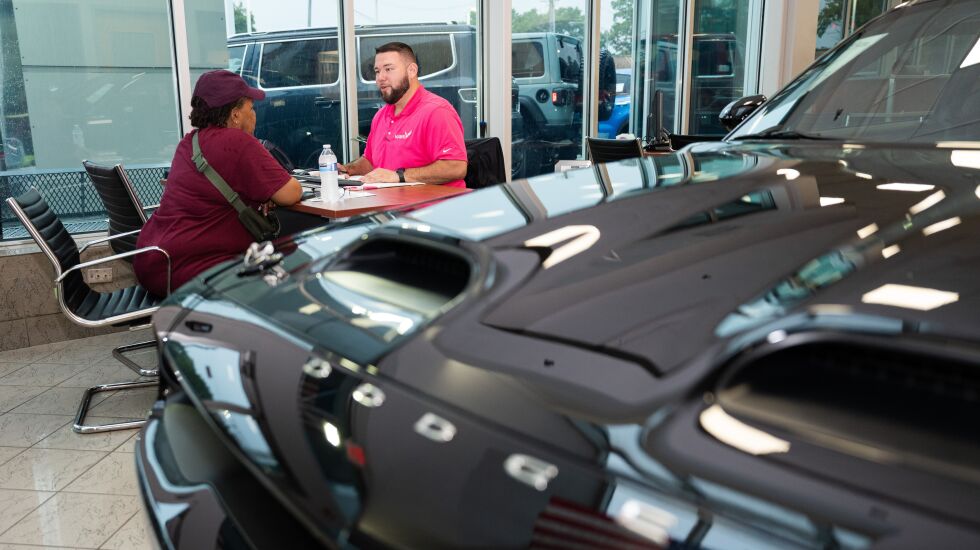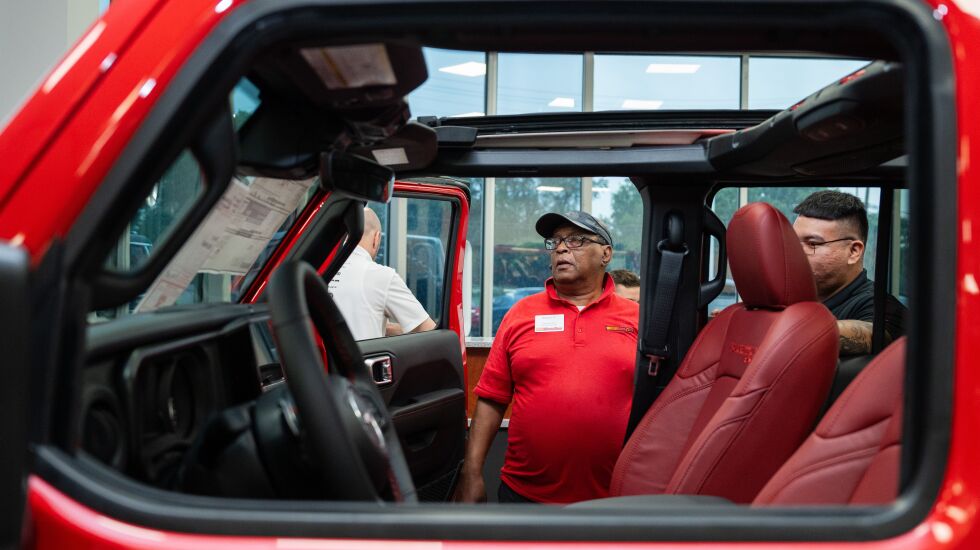
If you think the latest electric vehicle price war between Tesla and its competitors like Ford and Lucid will expand to gas-powered or hybrid vehicles, think again.
Analysts report that prices are holding firm as demand strengthens, even in the face of rising interest rates for auto loans. The Federal Reserve ordered its 11th rate hike Wednesday to tamp down inflation, a move that could nudge auto loan rates higher.
Some experts said they hope the vehicle industry, disturbed by parts shortages during the pandemic, can slowly return to a normal balance of supply and demand.
Since 2020, automakers have enjoyed pricing power. During the last three years, the average price for a new vehicle rose about 20% to around $48,000, according to the trade group Alliance for Automotive Innovation.
“Interest rates were so low for so long,” said Richard Hilgert, senior equity analyst at Morningstar who covers automotive stocks. “We really had the strongest pricing environment for manufacturers I’ve seen in 30 years.”
Sticker shock may be old hat for buyers, but something else is at work when they enter a dealership.
John Crane, managing member of the Hawk Auto Group dealerships, which handles many domestic and foreign brands, called it a “compromise market” for many buyers. People decide they can’t afford a first choice, he said, so they settle on a backup, such as buying a late-model used car instead of new. He added that a fleet buyer might take two trucks instead of six.
He said the trend is helping to keep used car prices high. Crane also said that with rising interest rates, a monthly car payment that was around $500 a couple years ago now might be $800.
“Reality is starting to sink in and the consumer is not going to keep buying” if prices continue to increase, Crane said.
Manufacturers know they are testing people’s limits, he said. Crane cited the example of Ford’s Maverick subcompact pickup, which starts at a relatively low $25,000.
Ford can’t build enough of them but fixing that is complicated. “With the Maverick, I knew we could sell two or three times our allocation,” Crane said. But he said increasing Maverick production can mean cutting output for vehicles with a higher profit margin.
Most buyers adjust to the higher prices as best they can, said South Lawndale resident David Herrera, a repeat customer at Hawk Chrysler Dodge Jeep Ram in Forest Park.
“It’s almost like you’re buying a small house,” said Herrera, who last year bought a Jeep Grand Cherokee L. He said the dealership worked with him to get attractive payment terms.
“It’s definitely an adjustment with inflation. Everybody just has to deal with it,” he said.
For months, dealers had trouble getting inventory because automakers were faced with shortages of computer chips needed for vehicle systems. Crane said the output situation has improved, with manufacturers still working though their own issues and most inventories are growing. He said that for some slower-moving models, he’s hit supply levels to cover 120 days and so isn’t ordering more.
In recent weeks, the industry has encountered another problem that ties up deliveries — a nationwide rail car shortage.
But last spring, when inventories were rising and EVs felt pricing pressure, auto analysts at UBS foresaw a general oversupply that would lead manufacturers to cut sticker prices. It didn’t happen.
Morningstar’s Hilgert said that while inventories have grown, they are still well below historic levels. “We’re just now catching up and the demand has been very healthy,” he said.
The UBS prediction of a “price war” caused many to take notice. Joseph Yoon, consumer insights analyst at Edmunds.com, said researchers there were at first inclined to agree with UBS. “Since then, prices have only gone up for new and used cars,” he said.

Experts also see signs of pent-up demand. They believe many people put off car purchases during the pandemic, with one indicator being a rising average age of vehicles offered as trade-ins.
A July report by Auto Outlook for the Chicago Automobile Trade Association said deferred sales in the local market could amount to 142,000 cars, about 45% of the average new registrations per year.
“It has been our contention that once vehicle production recovered, this ‘stored potential’ would more than offset the drag on sales resulting from higher interest rates, a slowing economy and weakening vehicle affordability,” the report said.
Overall, it’s not a great outlook for consumers. Yoon said that to address affordability, the manufacturers could decide to subsidize interest rates for purchasers.
He also said buyers should remember that their trade-in will help. He said that in 2020, the average trade-in was worth $13,000. Today, it’s $23,000.
The standard advice in car-buying still applies. Shop around and don’t make decisions based on impulse.
But beyond that, consider the counsel of another Edmunds analyst, director of insights Ivan Drury, who said in an online posting, “If holding off on a car purchase is no longer possible this summer, it’s time to seriously evaluate your list of must-haves versus nice-to-haves. Are you really planning on using that third row? Do you really need those extra bells and whistles? Because any of those upgrades are likely going to cost you far more than you might expect.”







